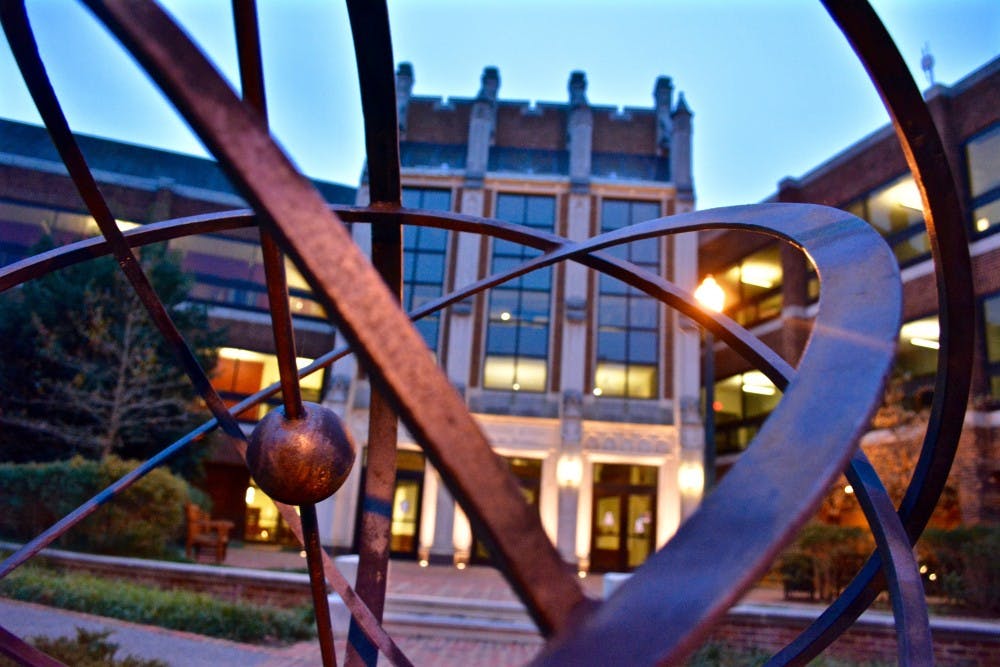A University of Richmond junior was recently awarded a Beckman Foundation scholarship for her research into improving detection of some diseases, such as prostate cancer and sepsis.
The student, Najwa Labban, has found better ways to measure substances that can indicate the presence of these diseases.
The scholarship will provide support “for a mentored research project over two summers and one academic year,” according to the Beckman Foundation website, meaning that Labban will be able to continue her research through the summer after her graduation.
Labban's research focuses on the fact that physicians can detect potentially fatal diseases by using biosensors, or materials that measure the level of substances in a bodily fluid, Labban said. Labban found a biosensor to measure sarcosine levels, which can help identify a patient with prostate cancer.
She said she also had researched using lactate to measure sepsis. Sepsis is easy to treat when caught, but hard to diagnose because it often seems like the flu. It can kill patients within 24 hours if untreated. Labban said that her next project would be researching a way to measure cholesterol.
Labban will attend the Beckman Scholars Symposium in Irvine, California, this year, and will present her research at the symposium next year, said Julie Pollock, an assistant professor of chemistry who oversees Labban’s research and nominated her for the scholarship.
Labban is conducting research with Pollock and Michael Leopold, a chemistry professor at UR, as well as with Will Case, an assistant professor of chemistry at Converse College, Labban said.
Labban also works with several other students, including senior Libby Doll, who said Labban was great at teamwork. When Doll was stressed about applying to medical schools over the summer, Labban helped.
“She was really good about noticing that I was stressed and then offered to take tasks off my plate so that I could focus on the things that were stressing me out," Doll said. "She’s very considerate in addition to being hardworking."
The team’s research on sarcosine was published in the Journal of Electroanalytical Chemistry. This research has real-life implications, Pollock said.
“One of the problems with prostate cancer is that the marker that they use right now to detect for it is problematic," she said. "A lot of times you get a lot of false positives associated with it, and so identifying a new thing that would be able to detect prostate cancer at an earlier stage or more consistently without those false positives would be very good."
Labban finds research rewarding for the sense of accomplishment and ability to be published, she said.
Enjoy what you're reading?
Signup for our newsletter
"When I started making the lactate sensor, I was testing experiment after experiment after experiment, and I just couldn’t get a signal," she said.
After weeks, Labban said she had finally found the correct combination of materials to form a sensor.
Labban became interested in research during her freshman year when she took Leopold’s organic chemistry lab.
“By the end of the semester, I just knew that I wanted to be in his lab regardless of really what they did," Labban said. "It just so happened that the work they did was analytical chemistry work dedicated to building biosensors, which is really cool because the biosensors have this medical application."
After graduation, Labban wants to complete an M.D./Ph.D. program, she said. She plans to earn her Ph.D. in biochemistry and wants to be a pediatric oncologist.
“I would ideally like to start in the clinical realm, like practicing medicine, and then move to an academic institution where I can run my own lab and teach,” Labban said.
Research helped Labban define this goal, Leopold said.
“She transformed from wanting to just be a practicing clinician to somebody that wants to be part of curing the disease and treating the patients," he said.
In the future, Leopold said that he could see Labban solving problems for people in some capacity.
Pollock said that she could see Labban in an academic hospital.
“She’s also a phenomenal teacher," Polluck said. "She’s going to make an impact both in the research and the treatment side of things with patients in the future, but I think she also has the potential to do it in an academic setting where she’s teaching the next generation."
Labban is a resident assistant, captain of the club track team, a tutor for the athletic department, a member of the Muslim Student Association and a member of Alpha Chi Sigma, a professional chemistry fraternity.
Contact news writer Katherine Schulte at katherine.schulte@richmond.edu.
Support independent student media
You can make a tax-deductible donation by clicking the button below, which takes you to our secure PayPal account. The page is set up to receive contributions in whatever amount you designate. We look forward to using the money we raise to further our mission of providing honest and accurate information to students, faculty, staff, alumni and others in the general public.
Donate Now



